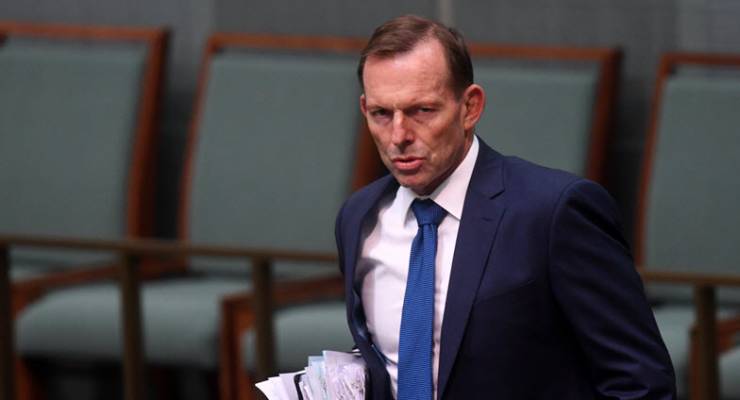
For two people who claim to be in touch with “the base”, it’s astounding how out of touch Tony Abbott and Peta Credlin are. In their blind determination to blast Malcolm Turnbull from the prime ministership using whatever issue or policy best does the job, the two have missed the fatal flaw in the latest stanza of their Kill Malcolm campaign, which involves the demonisation of renewable energy.
In an “exclusive” interview last night with one Murdoch media outlet, and comments today in another, Abbott has sought to escalate tensions with Turnbull over renewables by calling for the proposed Clean Energy Target to be dropped. Abbott also reportedly threatened to cross the floor against any government attempt to legislate a CET.
As much as Abbott claims his position is about reliable electricity and the need to establish product differentiation with Labor, his anti-renewables campaign is all too obviously about the Liberal leadership.
Until now, every issue thrown in Turnbull’s way by Abbott and his enablers — in order to bring on a leadership crisis — has been avoided by the embattled Prime Minister. Instead of resisting the demands of Abbott’s far-right supporters, Turnbull has accommodated almost every one of them. He agreed to water down section 18C of the Racial Discrimination Act (although the Senate blocked the changes), ended funding for Safe Schools, and persisted with a plebiscite on marriage equality.
Turnbull and his Energy Minister Josh Frydenberg also initially appeared to back down under pressure from Abbott’s camp on a clean energy target mooted to replace the renewable energy target in 2020. However the concept is being considered again after it was revived by the chief scientist, Dr Alan Finkel, in his report to the government on the future security of the national electricity market.
[Wonder why the Coalition dislikes renewables so much?]
If implemented, Finkel’s CET recommendation would fill the policy vacuum created by Abbott when he scrapped the carbon tax and created a lopsided market that only provided policy certainty to renewable energy providers. It’s no coincidence that not one coal-fired power station has been built since then.
Having created the policy settings that brought on the current “energy crisis”, Abbott is now trying to frame the best solution to the problem as yet another test of Malcolm Turnbull’s leadership — rather than an indictment of Abbott’s own.
The problem for Abbott and co. is that voters, especially those in some of the Coalition’s most marginal seats, love renewable energy — not necessarily for environmental reasons, but economic ones. And, for this reason, they are likely to have a dim view of Abbott’s anti-renewables stance.
These voters reside in the 1.7 million households with rooftop solar. To them, renewable energy means economic freedom — from the electricity bills that break the budget, and from the energy companies who gouge their customers. When Tony Abbott rails against renewables for causing blackouts or high power bills, these voters compare their reality with his rhetoric. And they know he’s talking through his hat.
This of course has political implications. Of the 20 Australian postcode areas with the highest number of rooftop solar installations (from 5900 rooftop solar units per postcode to almost 12,000), 13 are in Queensland. The postcodes cover two Coalition marginal seats and another 4-5 seats that would be at risk to One Nation.
Other data has shown that around 40% of rooftop solar installations occurred in rural and regional Australia, and that low-income households including older Australians feature heavily as adopters of the technology.
This explains the high number of Coalition voters that support renewables in the opinion polls. According to an Essential Poll in June, 57% of Coalition voters preferred more investment in renewables to meet Australia’s future energy needs compared with 26% who preferred more coal-fired electricity.
Another poll by the same organisation found in February that 58% of Coalition voters thought renewables were the solution to our energy needs, while 20% saw them as a threat to future energy supply. That’s an improvement on the same question four months earlier, when 52% of Coalition supporters saw renewables as a solution and 25% as a threat.
[Renewables slaughter pensioners in their beds, sell kids into slavery and worse!]
Even more interestingly, according to Essential, a majority of Coalition voters also support Labor’s 50% renewable target, with 48% approving in October last year, and 55% in February this year.
This would suggest that on the issue of renewables, Abbott and Credlin’s political antennae have yet again failed them. Even if Abbott argued that renewables are OK as long as the “subsidies” are scrapped, this would go down like a lead balloon with the 1.7 million households currently benefiting from small-scale certificates under the RET.
If Tony “Let’s Give the Prince a Knighthood” Abbott and Peta “Needs More Flags” Credlin really were in touch with the Liberal base, they’d know that renewable energy is a strength for Turnbull (and the Coalition) instead of a weakness.
This probably explains why Essential has also found the proportion of Coalition voters who want Abbott to resign from parliament has grown from 18% in August last year, to 31% in April this year and then 35% this July.








Crikey is committed to hosting lively discussions. Help us keep the conversation useful, interesting and welcoming. We aim to publish comments quickly in the interest of promoting robust conversation, but we’re a small team and we deploy filters to protect against legal risk. Occasionally your comment may be held up while we review, but we’re working as fast as we can to keep the conversation rolling.
The Crikey comment section is members-only content. Please subscribe to leave a comment.
The Crikey comment section is members-only content. Please login to leave a comment.